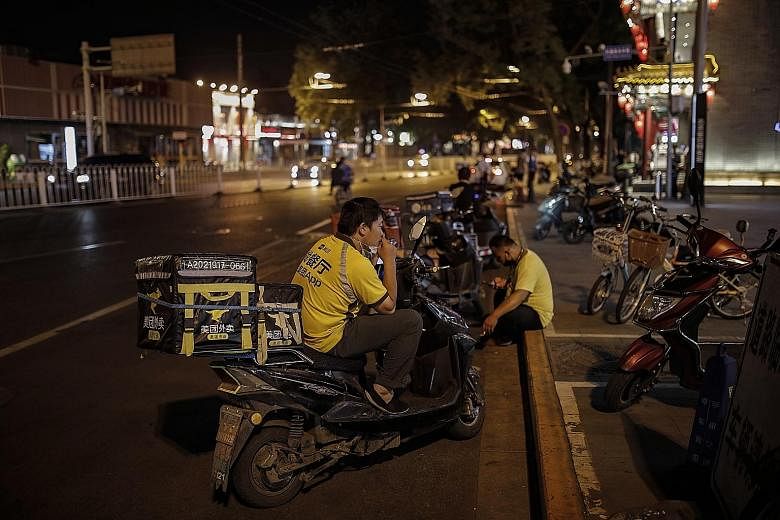Since the coronavirus outbreak in China, delivery rider Wu Jun has been taking extra precautions on the job.
He keeps a bottle of disinfectant on his electric scooter to sanitise his hands after every order and makes the extra effort not to touch his face.
But when news broke last Tuesday that a delivery rider working for the Ele.me platform had been diagnosed with Covid-19, Mr Wu, who works for a courier company, said he "felt a moment of panic".
"While we don't send as many orders as those on the food delivery platforms, we still come into contact with many people," he said.
He was among 100,000 delivery riders - including those who deliver food and groceries and others who handle online shopping packages - ordered to undergo nucleic acid testing for the coronavirus, the same way the Ele.me rider's case was detected.
The 47-year-old man, identified by local media as a Mr Kong, delivered up to 50 orders daily in Beijing's Fengtai district, ground zero for the new outbreak linked to a huge wholesale market in the area.
Since the first case surfaced on June 11, over 300 infections linked to the market have been detected in the capital alone, with dozens more related cases in several other provinces - from neighbouring Hebei province to the north-eastern Liaoning over 400km away.
Beijing city authorities have not imposed a full lockdown but have cordoned off several districts, while ordering mass testing for targeted groups, including market workers, food handlers and ride-hailing drivers.
The authorities yesterday said samples from some 8.2 million residents had been taken and that 7.6 million had been processed. All those ordered to undergo mandatory testing have done so, officials told a news conference. A lack of processing facilities had earlier led to a backlog.
Ordered again to remain indoors, consumers have turned to the Internet for their shopping and dining needs, relying on the services of an army of couriers and deliverymen.
The case of Mr Kong sparked a panic, with many wondering if one could be infected by such packages. Discussions on social media went into overdrive. But many comments were quickly scrubbed.
As China tries to recover from the effects of the Covid-19 pandemic, the government has encouraged domestic consumption in a bid to bolster the economy, with a focus on e-commerce.
All that remained were netizens discussing Mr Kong's 16-hour work days and the stress he must face.
"Working 16 hours a day, making a living is not easy," read one Weibo comment, "please get well soon".
There were multiple reassurances from health officials that ordering food and shopping online is relatively safe. Officials also reminded Beijingers to continue observing good hygiene, as well as to opt for contactless delivery and wash one's hands immediately after opening delivered packages.
"While the government has been urging contactless delivery, most people want us to deliver food to their doors, ever since housing estates have reopened," said Mr Feng Yisheng, a delivery rider who works for a major platform.
"If we don't agree to it, we end up getting a bad rating and this will affect our jobs," he added.
Unlike Mr Wu, who delivers items like documents and packages city-wide, Mr Feng focuses on a much smaller delivery radius and mostly handles takeaway and grocery orders.
"It's quite normal to take up to 50 orders a day, because we need to meet a quota. I won't lie, it's hard work, and if I had other skills I wouldn't do this," he said.











